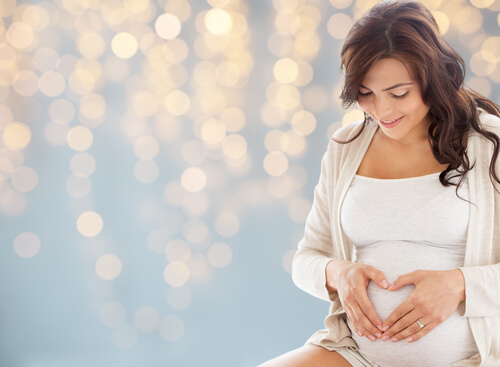Symptoms of the Second Trimester of Pregnancy

Conceiving a life and carrying it in your womb for nine months is a unique experience. The body transforms week by week.
The first 90 days are perhaps the most difficult due to hormonal changes and extra energy consumption. However, the symptoms of the second trimester of pregnancy aren’t as exhausting.
From week 13 to week 26, the physical changes of pregnancy become evident.
The belly and breasts continue to grow. Nausea disappears, but other signs such as back pain, skin pigmentation and constipation appear.
Specialists recommend monitoring or controlling weight gain in this phase.
By the sixth month, the mother should have gained at least 13 pounds in a healthy way.
12 symptoms of the second trimester of pregnancy
Some women may suffer from all the discomforts of pregnancy, while others only experience a few unpleasant symptoms. Some women don’t experience any.
Even so, these are the common symptoms of the second trimester of pregnancy:
- Pain. Especially related to the back, pelvis, hips and legs. As the baby grows, the weight of the belly is supported through the back. The ligaments in the hips and pelvis stretch and make way for the necessary widening in childbirth, which generates pain.
- Cramps. Beginning in the fourth month, leg cramps are common. These are generated by pressure exerted on nerves and blood vessels. A complication that creates great pain and swelling in the extremities is deep vein thrombosis, which must be attended to immediately by a doctor.
- Heartburn and constipation. The uterus grows and compresses the stomach and intestines, altering the transit of food and acids. The effect of hormones on the digestive system adds an extra layer of complexity to this issue. To avoid or reduce discomfort, it’s advisable to drink enough liquid and eat fruits and cereals, in addition to doing a little exercise.
- Beware of hemorrhoids! As a result of constipation and pressure on the rectal veins, hemorrhoids can appear or worsen in the second trimester of pregnancy. Alcohol and spicy foods should be avoided, and a training routine that relaxes the muscles is recommended.
- Skin pigmentation. These changes may diminish or disappear after pregnancy. Dark spots appear on the skin of the face, which becomes more sensitive to the sun. The breasts and belly also tend to stretch and dry out, resulting in itching or stretch marks.
- A very visible black line tends to pop up from the navel to the pubis. A good sunscreen will help prevent marks on the face, known as the “pregnancy mask.”

Other physical changes in the mother-to-be
- Hair changes. A pregnant woman’s hair suffers changes similar to those generated before menstruation. These problems can be alleviated by continuing to drink enough water, and using creams and oils on the skin.
- Sweating. Excessive sweating may be another symptom of the second trimester of pregnancy due to the increase in sweat glands.
To avoid or reduce digestive discomfort, it’s advisable to drink plenty of liquid and eat fruits and cereals. You also need to do a little exercise, like walking several minutes a day.
- Accelerated heart rate. More blood is pumped and the heart beats faster, which can trigger strong palpitations or tachycardia. Stress and excessive weight lifting can also affect the heart’s ability to function. This can be avoided with relaxation and correct posture.
- Alteration in the appearance of breasts. The breasts become large and heavy after the first trimester. However, it isn’t until the fourth month that new milk ducts develop.
- Around the areola, small nodules known as Montgomery tubercles appear. Blood flow to the breasts also increases and the veins become more noticeable.

- Vaginal discharge. The body generates antibodies, and during this time it expels a transparent or whitish substance through the vagina in greater quantities than usual. It’s odorless and prevents the formation of bacteria in the vagina.
- Inflamed gums. A small amount of bleeding may occur when brushing teeth. Due to excessive blood flow, nosebleeds or nasal congestion may also occur due to the swelling of the mucus membranes.
- Insomnia. The fetus’ movement can produce symptoms in the second trimester of pregnancy. The baby begins to stretch and do “push-ups” in the belly. These movements can cause pain or discomfort to the mother at bedtime, especially when she doesn’t have good posture.
As we said, these symptoms of the second trimester of pregnancy can vary according to the particularities of each woman, pregnancy and baby.
The main thing is to mitigate them as much as possible for a happy pregnancy.
Finally, remember that routine medical check ups allow you to raise questions and ask for solutions to any condition that may arise.
Conceiving a life and carrying it in your womb for nine months is a unique experience. The body transforms week by week.
The first 90 days are perhaps the most difficult due to hormonal changes and extra energy consumption. However, the symptoms of the second trimester of pregnancy aren’t as exhausting.
From week 13 to week 26, the physical changes of pregnancy become evident.
The belly and breasts continue to grow. Nausea disappears, but other signs such as back pain, skin pigmentation and constipation appear.
Specialists recommend monitoring or controlling weight gain in this phase.
By the sixth month, the mother should have gained at least 13 pounds in a healthy way.
12 symptoms of the second trimester of pregnancy
Some women may suffer from all the discomforts of pregnancy, while others only experience a few unpleasant symptoms. Some women don’t experience any.
Even so, these are the common symptoms of the second trimester of pregnancy:
- Pain. Especially related to the back, pelvis, hips and legs. As the baby grows, the weight of the belly is supported through the back. The ligaments in the hips and pelvis stretch and make way for the necessary widening in childbirth, which generates pain.
- Cramps. Beginning in the fourth month, leg cramps are common. These are generated by pressure exerted on nerves and blood vessels. A complication that creates great pain and swelling in the extremities is deep vein thrombosis, which must be attended to immediately by a doctor.
- Heartburn and constipation. The uterus grows and compresses the stomach and intestines, altering the transit of food and acids. The effect of hormones on the digestive system adds an extra layer of complexity to this issue. To avoid or reduce discomfort, it’s advisable to drink enough liquid and eat fruits and cereals, in addition to doing a little exercise.
- Beware of hemorrhoids! As a result of constipation and pressure on the rectal veins, hemorrhoids can appear or worsen in the second trimester of pregnancy. Alcohol and spicy foods should be avoided, and a training routine that relaxes the muscles is recommended.
- Skin pigmentation. These changes may diminish or disappear after pregnancy. Dark spots appear on the skin of the face, which becomes more sensitive to the sun. The breasts and belly also tend to stretch and dry out, resulting in itching or stretch marks.
- A very visible black line tends to pop up from the navel to the pubis. A good sunscreen will help prevent marks on the face, known as the “pregnancy mask.”

Other physical changes in the mother-to-be
- Hair changes. A pregnant woman’s hair suffers changes similar to those generated before menstruation. These problems can be alleviated by continuing to drink enough water, and using creams and oils on the skin.
- Sweating. Excessive sweating may be another symptom of the second trimester of pregnancy due to the increase in sweat glands.
To avoid or reduce digestive discomfort, it’s advisable to drink plenty of liquid and eat fruits and cereals. You also need to do a little exercise, like walking several minutes a day.
- Accelerated heart rate. More blood is pumped and the heart beats faster, which can trigger strong palpitations or tachycardia. Stress and excessive weight lifting can also affect the heart’s ability to function. This can be avoided with relaxation and correct posture.
- Alteration in the appearance of breasts. The breasts become large and heavy after the first trimester. However, it isn’t until the fourth month that new milk ducts develop.
- Around the areola, small nodules known as Montgomery tubercles appear. Blood flow to the breasts also increases and the veins become more noticeable.

- Vaginal discharge. The body generates antibodies, and during this time it expels a transparent or whitish substance through the vagina in greater quantities than usual. It’s odorless and prevents the formation of bacteria in the vagina.
- Inflamed gums. A small amount of bleeding may occur when brushing teeth. Due to excessive blood flow, nosebleeds or nasal congestion may also occur due to the swelling of the mucus membranes.
- Insomnia. The fetus’ movement can produce symptoms in the second trimester of pregnancy. The baby begins to stretch and do “push-ups” in the belly. These movements can cause pain or discomfort to the mother at bedtime, especially when she doesn’t have good posture.
As we said, these symptoms of the second trimester of pregnancy can vary according to the particularities of each woman, pregnancy and baby.
The main thing is to mitigate them as much as possible for a happy pregnancy.
Finally, remember that routine medical check ups allow you to raise questions and ask for solutions to any condition that may arise.
This text is provided for informational purposes only and does not replace consultation with a professional. If in doubt, consult your specialist.








